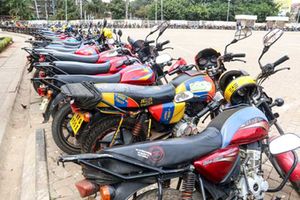
Boda-boda riders and other riders whose motorbikes were allegedly stolen were recently, search for their motorbikes during a display by police at Eldoret Police Station.
He who does not prevent a crime when he can, encourages it. ~ Lucius Annaeus Seneca
In recent weeks, an alarm has been loudly sounding on rising motorbike theft in several parts of the country. Motorcycle theft is a rampant problem countrywide. Theft cases, which most of the time include violent criminal activities, have been a common threat facing the boda-boda community and sector in general.
As a nation develops, crime tends to evolve, and the recent spate of motorbike thefts clearly points to organised crime ring activity. This year, more than 10,000 bikes have been reported stolen in various parts of the country, and within the same period, more than 6,000 bikes have been recovered. The pointers for organised crime are clear for all to see, including the lack of traceability once the bikes are stolen and the violent nature of some incidents. See, petty criminals stealing bikes aim to harvest spare parts or sell them cheaply in the neighbourhood.
However, in our current circumstances, bikes stolen as far as Western Kenya have their trackers disabled in Kisii and, in rare recovery cases, found near the Kenya-Tanzania border, meaning many bikes are crossing our borders for onward sale. These are all tell-tale signs of an elaborately organised cross-border trade in stolen motorbikes.
Reputation risk
For Buy Now Pay Later (BNPL) credit solution providers such as Watu Credit, this organised crime challenge brings a heavy price in asset and reputation risk. In a market where nine out of ten bikes are financed, the organised crime gang leaders have been shameless enough to blame credit solution providers for the theft cases. Of course, credit solution providers are easy scapegoats because they are perceived to have an interest by virtue of their funding business. Nothing can, however, be farther from the truth than such scapegoating. Credit solution providers are counting losses like bike owners, as the assets are due to the steep insurance premiums as the risk grows. Secondly, it can never be in our interest to incubate a secondary market based on stolen bikes, as the fundamentals for the same portend industrywide doom.
Asset FinTechs provide a convenient BNPL solution that allows Kenyans with a minimum down payment to proudly own assets such as vehicles, motorbikes and mobile phones with flexible weekly payment plans. The asset price applied in the BNPL model is made up of the retail price of the asset and the value-added services. In this case, the value-added services include a price component for the GPS tracker, log book transfer, customer service, and a 24/7 emergency response team all charged at cost with no extra margin.
Security agencies
For an industry player with more than one million financed bikes, how would it make business sense to steal or facilitate the theft of 600 bikes, for argument's sake? At Watu Credit, for example, our focus is on transitioning the current client portfolio from internal combustion engines to electric-powered bikes and ultimately growing with them to a level where we can finance them to own a car or further expanding their bike fleets.
As industry players, we have also alerted members of the National Assembly, among other stakeholders, that approximately 60-70 per cent of motorcycles in Kenya have been financed by Watu. Thus, an increase in motorcycle theft incidents, by default, has a greater impact on our customers. This is a challenge that poses a big concern to us as key stakeholders within the public transport sector. To curb the suspected cross-border organised crime syndicate involving Kenyan registered motorbikes, security agencies and other sector players, including boda-boda associations, must work closely with financing firms currently hard-hit by the vice.
While financing firms have invested heavily in customer support platforms, they are not well placed to handle crime management through intelligence-led or crime countermeasure strategies. They are, however, willing to collaborate with crime management agencies such as the National Police Service to support efforts by the Directorate of Criminal Investigations (DCI) to investigate and bring the organised crime masterminds to book.
Failure to collaborate or continued scapegoating is likely to erode trust in the vital economic sector, which facilitates national development by aiding Kenyans in owning assets that help them earn their daily bread and contribute to nation-building.
Mr Volokha is the General Manager for Watu in East Africa









